OUR ROOTS
THE LANDS OF FEUDO DISISA IN THE DOC MONREALE
Clay soils of medium texture with little skeleton that do not retain moisture. This is the dominant characteristic of the soils of the Feudo Disisa Estate. Rich in minerals, in particular silica and iron, they give a plus of minerality and flavor that we find in wines and oils Feudo Disisa, ensuring structure and longevity.
WHERE WE HAVE OUR ROOTS
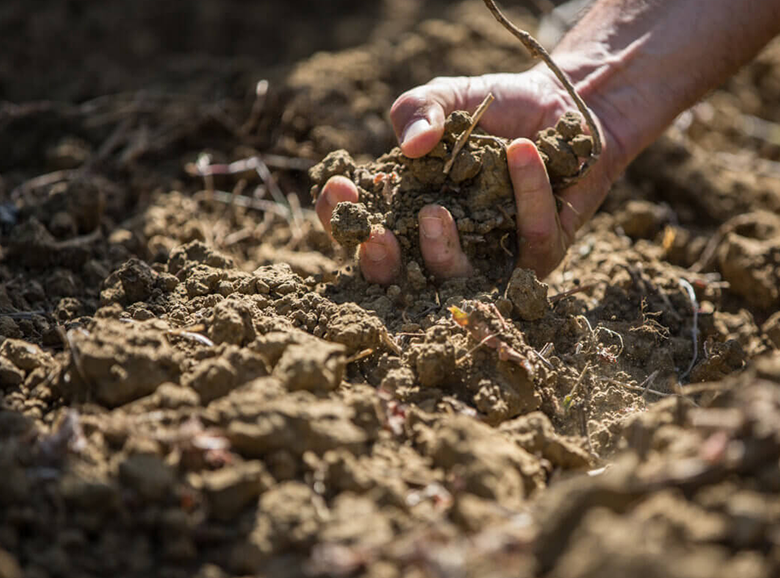
The land is nourishment and fertility. Mother of a biodiversity that allows and shapes the very possibility of life. The nature and orography of the land evolve over time, defining its climate and allowing for the creation of ever-changing production landscapes. The countryside of Monreale consists mainly of hills that flow north and south of the valley of Jato and Belìce, encircling it in a sort of crown, with mountains and high hills that channel the winds, collecting and conveying water and moisture to the lower areas. Valuable agricultural lands shaped over centuries by human labour, farmers knowledge and ability to cultivate crops while respecting the habitat and its biodiversity. Soil quality is a fundamental component, and so are the choice of varietals and the winemaker’s experience and wisdom as he transforms the grapes he has grown into excellent wine.
Knowing how to decipher the potential of your natural environment requires knowledge, observation and commitment, always. Wind and sun exposure, altitude, incline, soil composition, these are not inert data to be collected and studied, but elements that combine to define the uniqueness of a wine, of a label, of the producer who has created and curated every aspect of its character. The soils are a reservoir of nutrients essential to life and also contain a dearth of information that, if properly interpreted, will determine the physiognomy of a grape cluster, an olive, an ear of wheat. This soil is the birthplace and the guardian of the vegetative-productive life of each plant that has taken root in it.
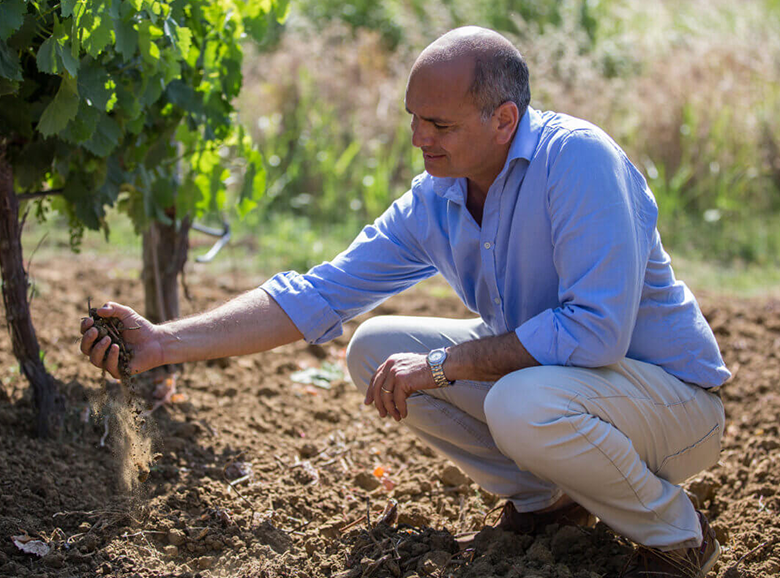
THE LANDS OF FEUDO DISISA IN THE DOC MONREALE
Clay soils of medium texture with little skeleton that do not retain moisture. This is the dominant characteristic of the soils of the Feudo Disisa Estate. Rich in minerals, in particular silica and iron, they give a plus of minerality and flavor that we find in wines and oils Feudo Disisa, ensuring structure and longevity.
WHERE OUR ROOTS GROW

The land is nourishment and fertility. Mother of a biodiversity that allows and shapes the very possibility of life. The nature and orography of the land evolve over time, defining its climate and allowing for the creation of ever-changing production landscapes. The countryside of Monreale consists mainly of hills that flow north and south of the valley of Jato and Belìce, encircling it in a sort of crown, with mountains and high hills that channel the winds, collecting and conveying water and moisture to the lower areas. Valuable agricultural lands shaped over centuries by human labour, farmers knowledge and ability to cultivate crops while respecting the habitat and its biodiversity. Soil quality is a fundamental component, and so are the choice of varietals and the winemaker’s experience and wisdom as he transforms the grapes he has grown into excellent wine.

Knowing how to decipher the potential of your natural environment requires knowledge, observation and commitment, always. Wind and sun exposure, altitude, incline, soil composition, these are not inert data to be collected and studied, but elements that combine to define the uniqueness of a wine, of a label, of the producer who has created and curated every aspect of its character. The soils are a reservoir of nutrients essential to life and also contain a dearth of information that, if properly interpreted, will determine the physiognomy of a grape cluster, an olive, an ear of wheat. This soil is the birthplace and the guardian of the vegetative-productive life of each plant that has taken root in it.

CLIMATE AND SUSTAINABILITY
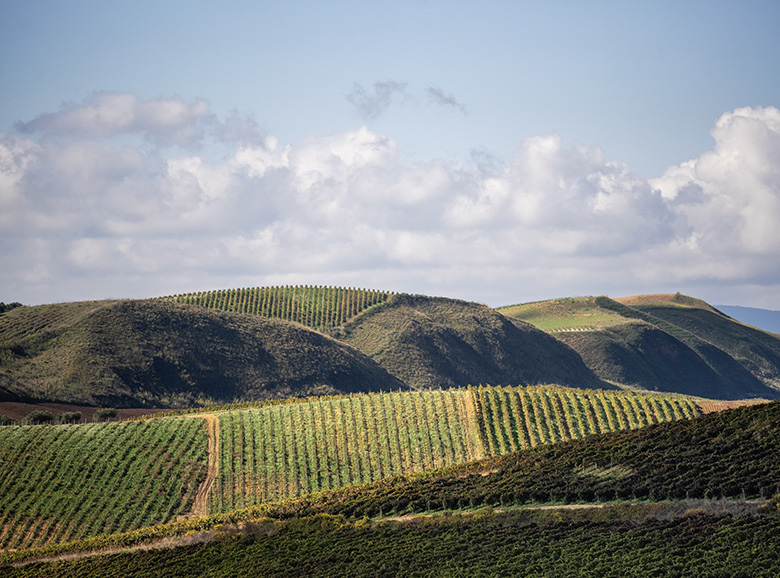
The air currents originating from the interplay of winds, often blowing in from the sea, the wooded areas either native of the product of reforestation initiatives, the local bodies of water, all these factors exert a powerful mitigating influence - especially in terms of temperature and humidity control – on the entire area. These are aspects of no secondary importance from a climatic standpoint that occur both in the colder and warmer seasons, orienting the cultivation practices – especially on vineyards and olive groves – useful for achieving that balance between man and nature that we call environmental and socio-economic sustainability. Management of natural water resources, maintenance of soil fertility, combating erosion and soil depletion are essential elements of a modern and innovative viticulture and olive growing, which is good for the environment, and that has always distinguished the productive commitment of our family.
CLIMATE AND SUSTAINABILITY

The air currents originating from the interplay of winds, often blowing in from the sea, the wooded areas either native of the product of reforestation initiatives, the local bodies of water, all these factors exert a powerful mitigating influence - especially in terms of temperature and humidity control – on the entire area. These are aspects of no secondary importance from a climatic standpoint that occur both in the colder and warmer seasons, orienting the cultivation practices – especially on vineyards and olive groves – useful for achieving that balance between man and nature that we call environmental and socio-economic sustainability. Management of natural water resources, maintenance of soil fertility, combating erosion and soil depletion are essential elements of a modern and innovative viticulture and olive growing, which is good for the environment, and that has always distinguished the productive commitment of our family.

OUR SOILS
The soil composition of the fields included in the Monreale Doc and more generally in the Alto Belice Corleonese area, tends to fit one of the following three profiles:
“Regosols – Brown earths – Slightly leached brown soils” ranging in texture from sandy to clayey. It is a typical profile characterized by the formation of soft substrates and by the presence of calcarenites and sand. They are typically soils found further downstream, those most suitable for the farming of extensive crops such durum wheat.
“Brown earths – Brown vertisol earths” is the typical association of the low hill gently undulating at altitudes mainly between 300 and 600 meters. s.l.m.: the most widespread in Feudo Disisa. Offering a consistent supply of nutrients, they are rich in potassium, an essential element which encourages the concentration of sugar in grapes. These soils have great potential and a marked fertility, they are among the best especially for the practice of viticulture. They express - also for exposure and slope - the greater viticultural area of Feudo Disisa, interspersed with large olive groves, planted in over 100 years of planting. Today the total area of our vineyards exceeds 150 hectares.
Alluvial soils with an AC or ABC type profile, often very coarse in texture with variable quantities of sand or clay. These soils are overall well-structured and productive, with a satisfying presence of organic matter and a fair amount of calcium. We find them in close proximity to the beds of the Belìce and Jato rivers
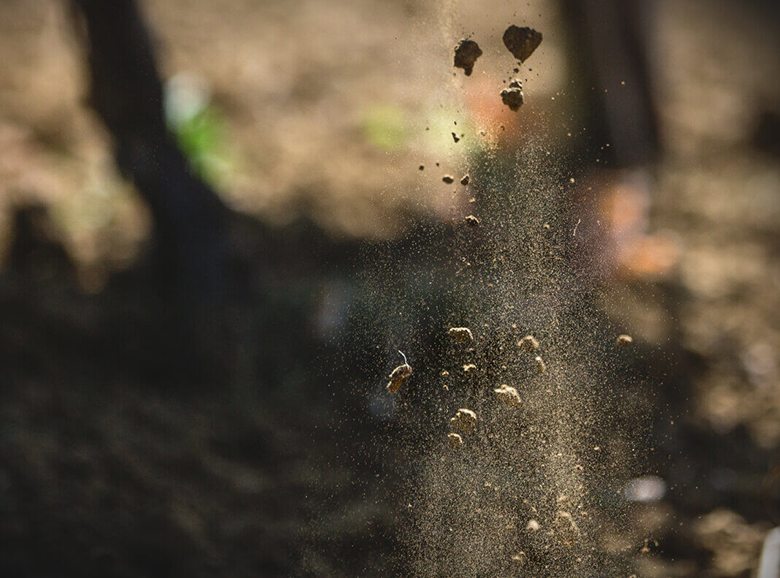
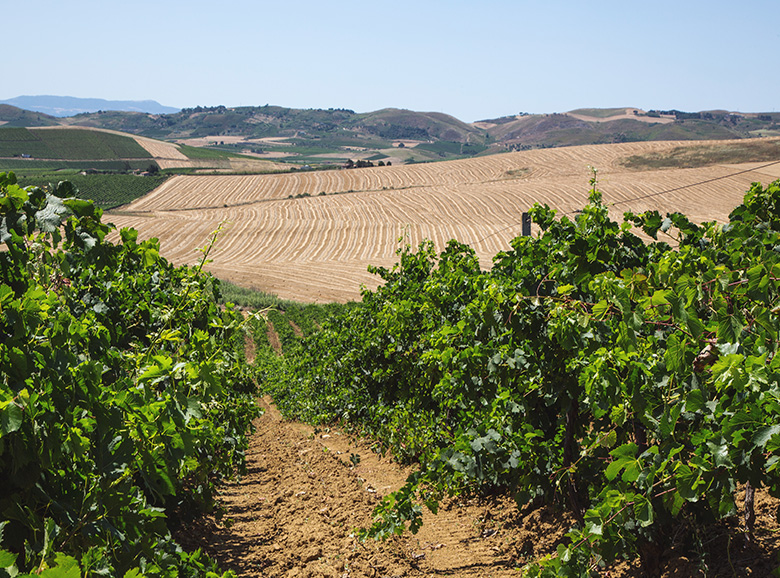
OUR SOILS
The soil composition of the fields included in the Monreale Doc and more generally in the Alto Belice Corleonese area, tends to fit one of the following three profiles:
“Regosols – Brown earths – Slightly leached brown soils” ranging in texture from sandy to clayey. It is a typical profile characterized by the formation of soft substrates and by the presence of calcarenites and sand. They are typically soils found further downstream, those most suitable for the farming of extensive crops such durum wheat.
“Brown earths – Brown vertisol earths” is the typical association of the low hill gently undulating at altitudes mainly between 300 and 600 meters. s.l.m.: the most widespread in Feudo Disisa. Offering a consistent supply of nutrients, they are rich in potassium, an essential element which encourages the concentration of sugar in grapes. These soils have great potential and a marked fertility, they are among the best especially for the practice of viticulture. They express - also for exposure and slope - the greater viticultural area of Feudo Disisa, interspersed with large olive groves, planted in over 100 years of planting. Today the total area of our vineyards exceeds 150 hectares.
Alluvial soils with an AC or ABC type profile, often very coarse in texture with variable quantities of sand or clay. These soils are overall well-structured and productive, with a satisfying presence of organic matter and a fair amount of calcium. We find them in close proximity to the beds of the Belìce and Jato rivers


